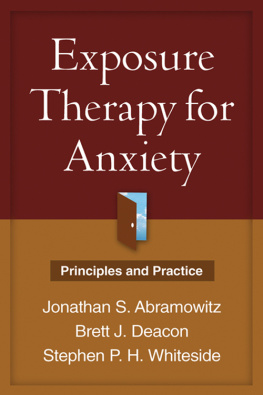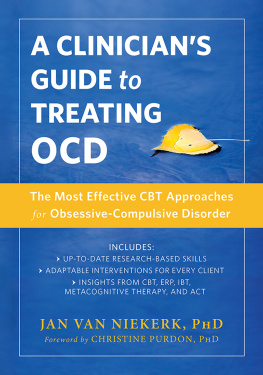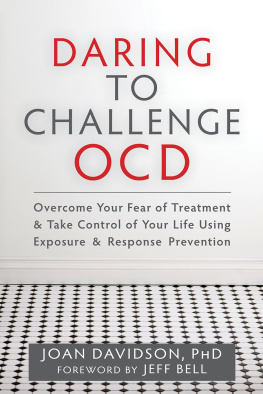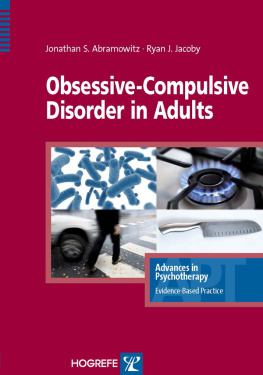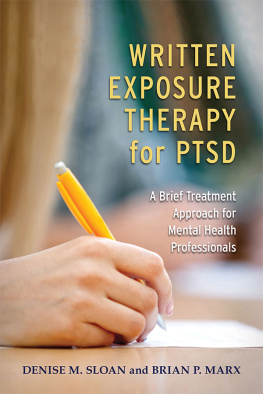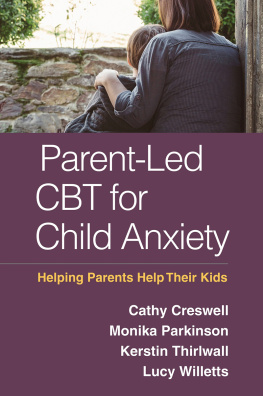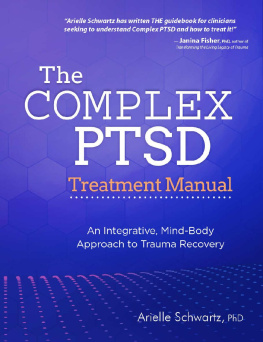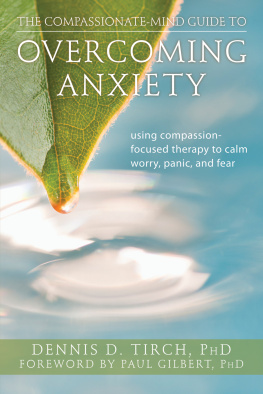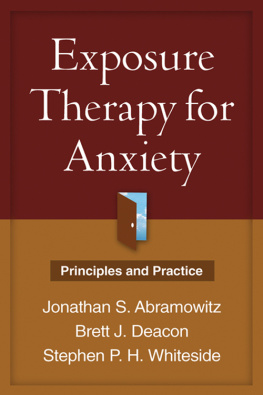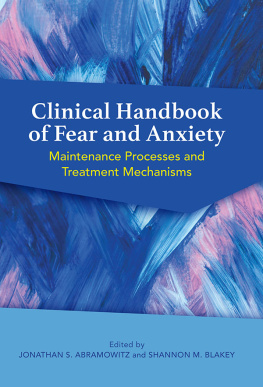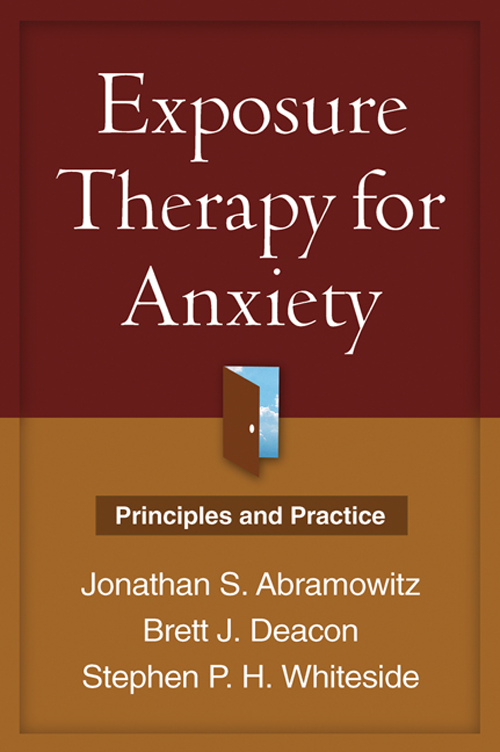Jonathan S. Abramowitz
Brett J. Deacon
Stephen P. H. Whiteside
2011 The Guilford Press
A Division of Guilford Publications, Inc.
72 Spring Street, New York, NY 10012
www.guilford.com
All rights reserved
2011 Epub Edition ISBN: 9781609180171
Except as indicated, no part of this book may be reproduced, translated, stored in a retrieval system, or transmitted, in any form or by any means, electronic, mechanical, photocopying, microfilming, recording, or otherwise, without written permission from the publisher.
Printed in the United States of America
This book is printed on acid-free paper.
Last digit is print number: 9 8 7 6 5 4 3 2 1
LIMITED PHOTOCOPY LICENSE
These materials are intended for use only by qualified mental health professionals.
The publisher grants to individual purchasers of this book nonassignable permission to reproduce all materials for which photocopying permission is specifically granted in a footnote. This license is limited to you, the individual purchaser, for personal use or use with individual clients. This license does not grant the right to reproduce these materials for resale, redistribution, electronic display, or any other purposes (including but not limited to books, pamphlets, articles, video- or audiotapes, blogs, file-sharing sites, Internet or intranet sites, and handouts or slides for lectures, workshops, webinars, or therapy groups, whether or not a fee is charged). Permission to reproduce these materials for these and any other purposes must be obtained in writing from the Permissions Department of Guilford Publications.
The authors have checked with sources believed to be reliable in their efforts to provide information that is complete and generally in accord with the standards of practice that are accepted at the time of publication. However, in view of the possibility of human error or changes in behavioral, mental health, or medical sciences, neither the authors, nor the editor and publisher, nor any other party who has been involved in the preparation or publication of this work warrants that the information contained herein is in every respect accurate or complete, and they are not responsible for any errors or omissions or the results obtained from the use of such information. Readers are encouraged to confirm the information contained in this book with other sources.
Library of Congress Cataloging-in-Publication Data
Abramowitz, Jonathan S.
Exposure therapy for anxiety: principles and practice / by Jonathan S. Abramowitz, Brett J. Deacon, and Stephen P. H. Whiteside.
p.; cm.
Includes bibliographical references and index.
ISBN 978-1-60918-016-4 (hard cover: alk. paper)
1. Anxiety disordersTreatment. 2. Exposure therapy. I. Deacon, Brett J. II. Whiteside, Stephen P. H. III. Title.
[DNLM: 1. Anxiety Disorderstherapy. 2. Implosive Therapymethods. WM 172]
RC531.A27 2011
616.8522dc22
2010037386
To the many patients we have treated
and therapists we have supervised; you have taught
us much about the nature and treatment of anxiety
To Stacy, Emily, and Miriam Abramowitz
with all my love
J. S. A.
To my parents, Robert and Sharon Deacon,
with love and gratitude
B. J. D.
To my wife, Catherine, and my parents, Jim and Mary;
thank you for all your patience and support
S. P. H. W.
Jonathan S. Abramowitz, PhD, ABPP, is Professor and Associate Chair of the Department of Psychology and Research Associate Professor in the Department of Psychiatry at the University of North Carolina (UNC) at Chapel Hill. He is also Director of the UNC Anxiety and Stress Disorders Clinic. Dr. Abramowitz conducts research on anxiety disorders and has published 10 books and over 150 peer-reviewed research articles and book chapters. He currently serves as Associate Editor of the journals Behaviour Research and Therapy and Journal of Cognitive Psychotherapy and on the editorial boards of several other scientific journals. He is a member of the board of directors of the Anxiety Disorders Association of America and the Scientific Advisory Board of the International OCD Foundation. Dr. Abramowitz received the Outstanding Contributions to Research Award from the Mayo Clinic Department of Psychiatry and Psychology in 2003 and the David Shakow Early Career Award for Distinguished Scientific Contributions to Clinical Psychology from Division 12 of the American Psychological Association in 2004. He regularly presents papers and workshops on anxiety disorders and their treatment at regional, national, and international professional conferences.
Brett J. Deacon, PhD, is Associate Professor in the Department of Psychology at the University of Wyoming and Director of the University of Wyoming Anxiety Disorders Clinic in Laramie. Dr. Deacon has published over 50 peer-reviewed research articles on the nature and treatment of anxiety disorders. He serves on the editorial boards of numerous scientific journals and is a member of the Clinical Advisory Board of the Anxiety Disorders Association of America. He is the recipient of numerous teaching and research awards from the University of Wyoming as well as the Northern Illinois University College of Liberal Arts and Sciences Golden Anniversary Alumni Award in 2009. Dr. Deacon regularly presents workshops on cognitive-behavioral therapy for anxiety disorders at regional and national conferences.
Stephen P. H. Whiteside, PhD, ABPP, is Associate Professor of Psychology and Director of the Child Anxiety Disorders Program at the Mayo Clinic in Rochester, Minnesota. He conducts research on the assessment and treatment of childhood anxiety disorders, including the use of neuroimaging to examine the effects of cognitive behavioral therapy. He has received research funding from the International OCD Foundation and has published 35 articles and book chapters. Dr. Whiteside serves on the editorial board of the Journal of Anxiety Disorders and on the Education and Training Committee of the Minnesota Psychological Association.
T his book reflects how we understand and treat clinical anxiety problems. The conceptual model and intervention strategies elucidated herein are based on a firm foundation of scientific literature that we are at once students of and contributors to. We wish to thank all of those who have helped us learn from and add to this knowledge, including the countless patients with whom we have worked (some successfully and some unsuccessfully) and therapists we have supervised, as well as the many outstanding teachers who have been instrumental in our growth and learning. Several individuals who have served as our teachers and mentors deserve specific mention: Edna Foa, Martin Franklin, Arthur Houts, Paul Kettlewell, Michael Kozak, Don Lynam, and David Valenteiner. We thank these individuals for their insights and hope they will see their influence reflected in this book. We are also enormously fortunate to have an outstanding network of collaborative relationships with fine clinicians and scholars in the field of anxiety disorders. We are especially grateful to Julie Dammann, Sarah Kalsy, Dean McKay, Bunmi Olatunji, Brad Riemann, Steven Taylor, Mike Tiede, and David Tolin, who have helped us refine our thinking about the concepts and techniques discussed in this book. And, most of all, we would like to thank our families, who have been very patient with us while we labored over this project. We hope you are as proud of us as we are of you.

